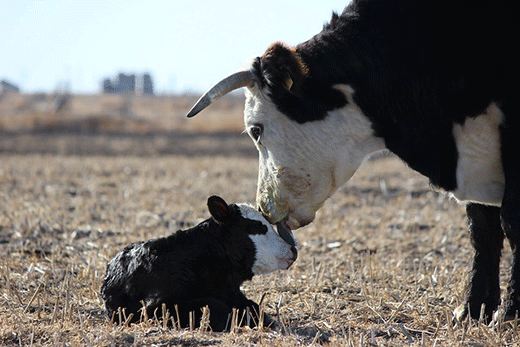
Kansas State University beef extension veterinarian A.J. Tarpoff says cow-calf producers should get a bull soundness exam to ensure breeding success.| Download this photo.
K-State veterinarian urges producers to conduct bull soundness exam
Test can determine if bull is ready for breeding season
April 22, 2019
MANHATTAN, Kan. – This time of year, A.J. Tarpoff enjoys warmer temperatures and green grass just as much as the next guy, but you might cut him a little slack if he thinks a bit differently about the onset of spring-like weather.
Tarpoff, a beef extension veterinarian at Kansas State University, turns his thoughts to cow-calf producers and the need to get bulls ready for the upcoming breeding season.
“We need to make sure we check these bulls and if they’re not fit for the breeding season, we still have some time for our producers to go purchase another bull,” Tarpoff said.
He said that producers should contact their local veterinarian and schedule a breeding soundness exam, which can test for the overall fitness of the bull.
“This year is a little bit peculiar because we have actually had a real winter,” Tarpoff said. “We need to make sure our bulls are fit coming into the breeding season. This year, I’m concerned a little bit more on semen quality and adequate motility.”
He adds: “We have to remember that even though we’ve checked fertility on these bulls the last several years, things can happen. These semen checks are a glimpse at whether they’re viable today.”
Tarpoff suggests that producers have a breeding soundness exam done on their bulls at least 30 to 60 days before the breeding season, based on when they expect to calve and market those animals. If the veterinarian has concerns with a given bull, there is still time for it to possibly recover and be re-tested.
The exam, Tarpoff says, includes a physical exam as well as a look at the bull’s body condition.
“Keep in mind that these bulls are athletes,” he said. “They can actually lose two body condition scores during the breeding season. So we want to make sure that we have adequate fat cover going into the breeding season to make sure they have the energy stores for their work ahead.”
The exam also is an opportunity to test for certain diseases, such as trichomoniasis, bovine viral diarrhea virus, anaplasmosis and others.
“This is the insurance for the cow-calf operation, insurance for reproduction, insurance for fertility,” Tarpoff said. “And these are all very important aspects for the cow-calf producer.”
In addition to a local veterinarian, producers may also contact their local extension agent for more information.

